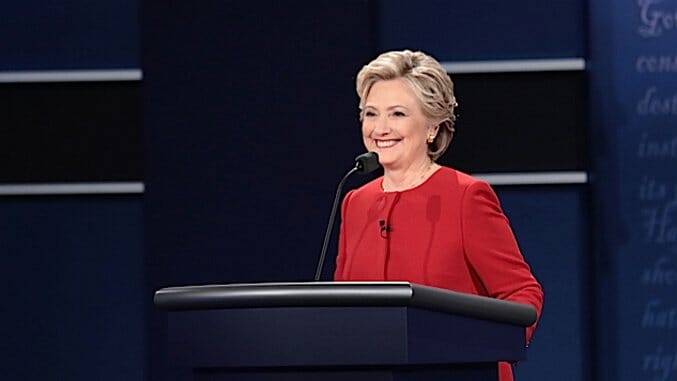Beat the Press: In the First Debate, Clinton Didn’t Just Exceed Expectations, She Defied Them
Photo by Drew Angerer/Getty
He interrupted and interjected, screamed, harrumphed, and sighed, but the most devastating moment of Donald J. Trump’s hapless presidential debate came from the ranks of the spectators. Asked in advance to refrain from responding, those inside the hall at Hofstra University Monday night were boisterous from the beginning—to the point that the moderator, NBC’s Lester Holt, paused the proceedings to request silence—though in this case the noise seemed more instinctive than planned. As the Republican nominee claimed to “have a better temperament” than his Democratic opponent, Hillary Clinton, a ripple of laughter ran through the room, and the man defined by the adoration of crowds at last met an incredulous audience: No longer protected by the “red meat”-eaters of primary season, or for that matter the Republican convention, the notion that Trump’s temperament is the match of Clinton’s merited no more than a chuckle.
In the aftermath of the first presidential debate, such skepticism seeped into the network panels and focus groups, too—one of the few mercies of the campaign’s recent rococo stage, with its fast-narrowing polls and bouts of pneumonia. At minimum, the mounting criticism of false equivalences and shallow reporting among the political press created the desired effect: ABC’s Byron York and Martha Raddatz fact-checked Trump’s dissembling deflection of birtherism; MSNBC followed up with Ford about his comments on the automaker’s outsourcing; even ardent Trump fan Laura Ingraham admitted, on Fox News, that “Hillary Clinton came prepared.” (One of the night’s unforced errors belonged, curiously enough, to the New York Times, which changed the lede of its top story to reflect the fact that Trump had not “relentlessly attacked” Clinton over “her private email server,” however much the Times might wish it were so.) Conservative commentators, undecided voters in Orlando, the Washington Post and Cokie Roberts agreed: Clinton came off “even-keeled” and “knowledgeable,” Trump “agitated” and “condescending.” For once, we were all speaking the same language.
Well, not quite “all.” One can forgive the serene Kellyanne Conway, Trump’s campaign manager, for criticizing the thoroughness of Clinton’s debate training; one can dismiss Trump shills/CNN “contributors” Jeffrey Lord and Kayleigh McEnany for doing the same, if not the network’s irresponsible president, Jeff Zucker. But Meet the Press moderator Chuck Todd’s description of Clinton as “over-prepared” once again illustrated the “old dog, new tricks” conundrum that has plagued much of the political media this election: In this intransigent commitment to the traditional hermeneutics of debate analysis, Todd and others proffered the usual mincing, mealy-mouthed descriptions, so careful to appear “objective” we need not have tuned in at all.
The foundational delusion of the process, of course, is that American politics presents a choice between center-left and center-right platforms on which “reasonable people can disagree in good faith,” and as such the debates have been reduced, in recent years, to a kind of highlight reel, a SportsCenter “Top Ten” of fumbles, zingers, and clever ripostes. Coupled with predictions that the first face-off between Clinton and Trump would attract as many viewers as the Super Bowl, this framework became, in the days and hours preceding the event, a self-fulfilling prophecy: The sets erected on Hofstra’s bright, broad quads resembled nothing so much as College Gameday, and CNN’s tagline, “Debate Night in America,” echoed that of NBC’s Sunday Night Football (“Football Night in America”). Countdown clocks descended to zero. Boxing metaphors proliferated. Todd himself compared Meet the Press, the longest-running political affairs program on television, to a “pre-game show,” and went to the tape to explain the Xs and Os of prior debate disasters. The sheer spectacle of this campaign has been irresistible to those for whom the preferred point of analysis is “optics,” and in this context the debate was pure catnip.
-

-

-

-

-

-

-

-

-

-

-

-

-

-

-

-

-

-

-

-

-

-

-

-

-

-

-

-

-

-

-

-

-

-

-

-

-

-

-

-








































